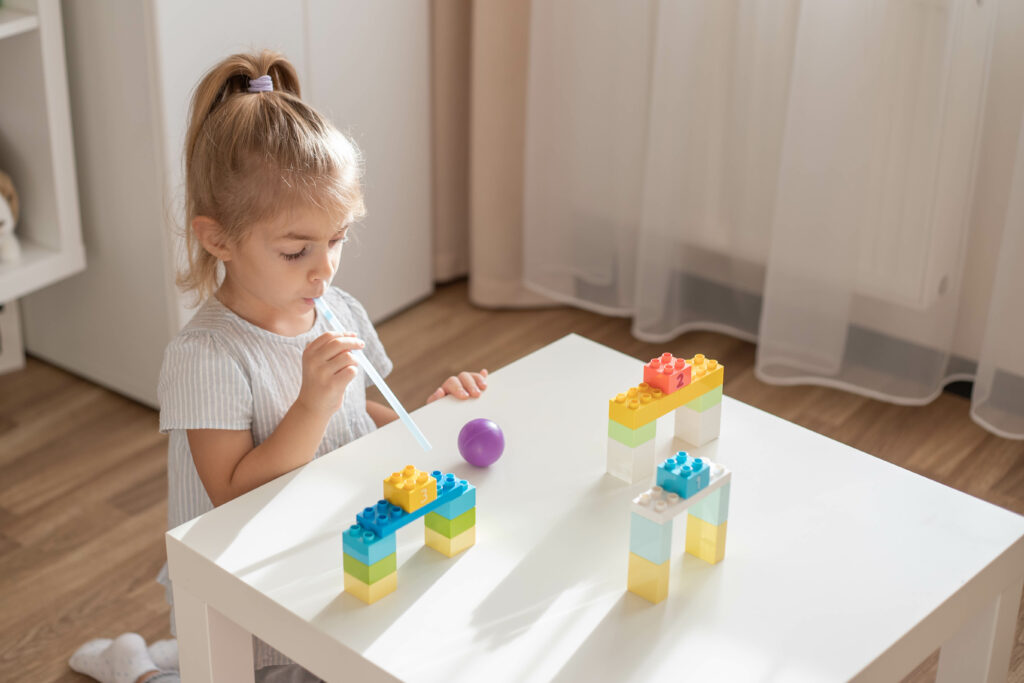What Is Oral Motor Therapy and Does My Child Need It?

Oral motor difficulties can interfere with feeding, speech, and development, impacting a child’s overall health and well-being. Clinical studies show that early intervention is highly effective in enhancing oral function. Dr. Halum and his team at Dentistry for Children offer oral motor therapy in a safe and comfortable environment. We are here to support your child’s journey to healthy development.
What Is Oral Motor Dysfunction in Children
Oral motor problems refer to difficulties with the muscles and movements involved in eating, drinking, and speaking. These muscles include the lips, tongue, jaw, and palate. Poor muscle tone can result in your child struggling during mealtimes and difficulty with sucking, chewing, or swallowing.
What Are the Causes of Oral Motor Concerns?
Here is a look at some of the factors that may cause oral motor concerns in children:
- Premature Birth: Infants born prematurely often have less developed oral muscles, increasing the risk of oral motor problems, which can interfere with feeding and speech development.
- Neurological Disorders: Certain neurological conditions, such as cerebral palsy or neuromuscular disorders, can result in difficulty programming the motor movements of the mouth or recalling how to perform them.
- Developmental Delays: Children with delays in reaching their developmental milestones are often prone to oral motor concerns that interfere with their oral motor function.
- Poor Muscle Tone: Poor muscle tone in the lips, tongue, or jaw can often lead to oral motor problems, impacting oral function and development.
- Oral Restrictions: Structural abnormalities, such as lip ties, tongue ties, or cleft palate, can disrupt normal oral function, leading to feeding and speech difficulties.
- Prolonged Bottle or Pacifier Use: Extended use of baby bottles or pacifiers can impact a child’s development and cause structural changes in the mouth, leading to oral motor dysfunction.
What Are Signs of Oral Motor Concerns?
Signs of oral motor concerns in children may include the following:
- Gagging or choking while eating or drinking
- Difficulty eating off a spoon
- Difficulty sucking from a bottle or drinking through a straw
- Failure to gain adequate weight
- Excessive drooling
- Holding the mouth or lips open
- Tongue thrusting, which can interfere with speech and feeding
- Sensitivity that can interfere with brushing and flossing
- Over-sensitivity to certain food textures or temperatures
- Speech delays or difficulty articulating sounds or words
- Slurred or slow speech
- Excessive mouth movement when speaking
- Difficulty with certain movements, including kissing, blowing bubbles, or making certain expressions
Evaluating and Addressing Oral Motor Concerns
If you see warning signs of oral motor difficulties, make sure to contact Dentistry for Children for an evaluation. Dr. Halum will start by taking your child’s medical history and discussing your concerns. Make sure to mention everything you notice because even the most subtle signs of oral difficulties can be helpful in determining the best approach to getting your child’s health on track.
The next step is an oral motor assessment. We will evaluate muscle tone and coordination and ask your little one to imitate certain facial expressions, like frowning, smiling, puckering the lips, or moving the tongue side to side. Depending on your child’s age, we may observe your child drinking through a straw, licking a lollipop, or repeating a string of sounds as fast as possible.
Based on the oral motor evaluation, Dr. Halum may recommend a custom treatment plan to guide your child’s oral motor development.
What Is Oral Motor Therapy?
Oral motor therapy is a form of therapy focused on improving the strength, coordination, and control of the muscles in the mouth, including the lips, tongue, palate, and jaw. It can be the ideal solution for younger children who are not yet ready for myofunctional therapy. Oral motor therapy has been found to be incredibly effective in improving a child’s ability to eat, speak, and engage in oral activities.
What Can You Expect?
We typically start oral motor exercises and activities to improve muscle strength and coordination. Your little one’s therapeutic sessions may include fun activities like blowing bubbles or drinking through straws, making silly faces, whistling, puckering the lips, and other oral exercises. Not only do these activities entertain, but they also significantly enhance your child’s oral function. As your little one’s oral function improves, we will continue to introduce more challenging tasks to continue increasing muscle strength and coordination.
Oral motor therapy may sometimes include sensory stimulation, such as exploring different food textures or oral sensations, to improve oral sensory awareness and tolerance. We may also work with your child to develop more effective chewing and swallowing strategies. We will introduce more challenging tasks, as needed, to continue increasing muscle strength, coordination, and overall oral function.
Home Oral Motor Exercises
An essential component of your little one’s oral motor therapy is completing home exercises as directed. The goal is to reinforce what we accomplish and slowly develop new, lasting habits. Remember, oral motor therapy should never feel like a punishment or tedious task. Have fun with your child blowing bubbles, performing tongue exercises, lip-smacking, and more. At-home oral motor exercises can help enhance lip strength and control, increase muscle strength and tone, and improve overall oral function.
Oral Motor Therapy Near Me in Highland, IN
If you see signs of oral motor concerns, contact Dentistry for Children to schedule a consultation. Dr. Halum and our kid-friendly team may recommend oral motor therapy to get your child’s oral development and function back on track. You can count on us for exceptional care that exceeds your expectations. We invite you to call our office at 219-924-5437 to schedule an appointment or use our online form to request one today!
